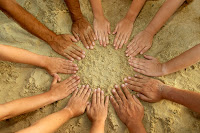
I'd always been under the impression that when Ben was ready to leave his group home, he'd be gradually weaned off the 24-hour staffing to, perhaps, 16 or 12 hours of supervision. But no. Ben's recent accomplishments, notably lasting six whole weeks at his new job, have forced the issue of getting him "graduated" from supervised housing to the next step. Evidently, there is no middle ground in our state. The next step is living alone. Yes, he qualifies for a med nurse to show up twice a day and carry out doctor's orders for supervision of meds. Yes, there is help "if he needs it" in the office a few blocks away. But still. While I share and applaud Ben's accomplishments to qualify for this next step, I am also as concerned about this change as I am happy for him.
Tomorrow, he moves. First and last month's rent? He only has part of it. Most of his benefits were withdrawn almost as soon as he received that first paycheck. So guess who has to make up the difference? What do people do who don't have parents to help them?
Furniture? He needs a bed, a table and chairs, the basics of life. So much need, so soon, with nothing in the bank to pay for it now. What if he had no family? What do others do? I think we'll be making daily visits to Goodwill for awhile. Our family has unlimited
love to give, but definitely not unlimited
funds. Far from it.
Ah, the thrill of the challenge. But finding furniture, and stocking Ben's fridge, will be the easier part. How do I stay away from the fear:
What if it's too much for him? What if, after seven careful years of building his life back up, this is too much independence, too soon?












